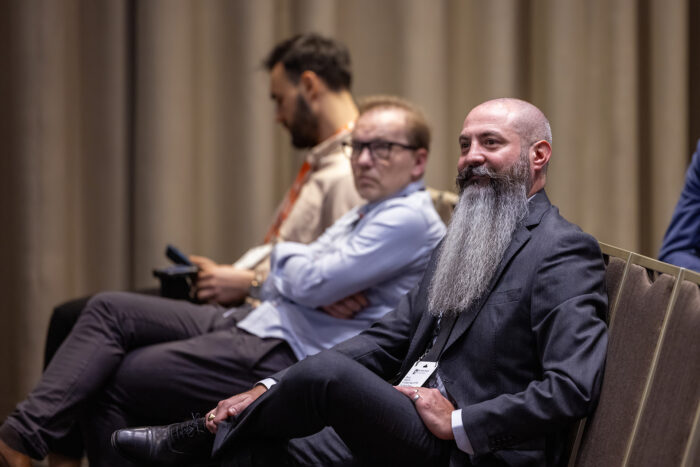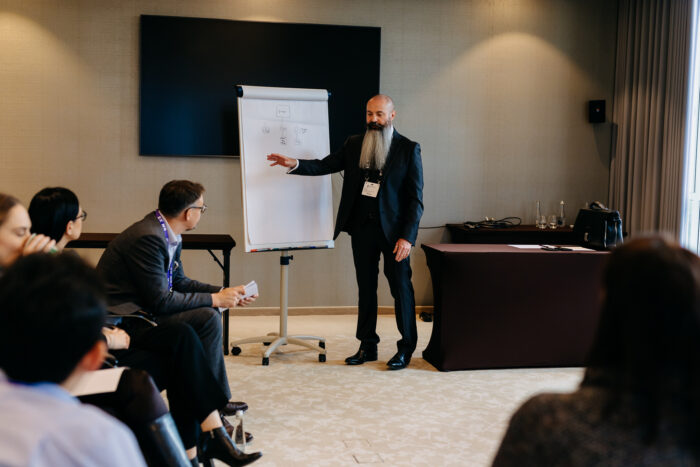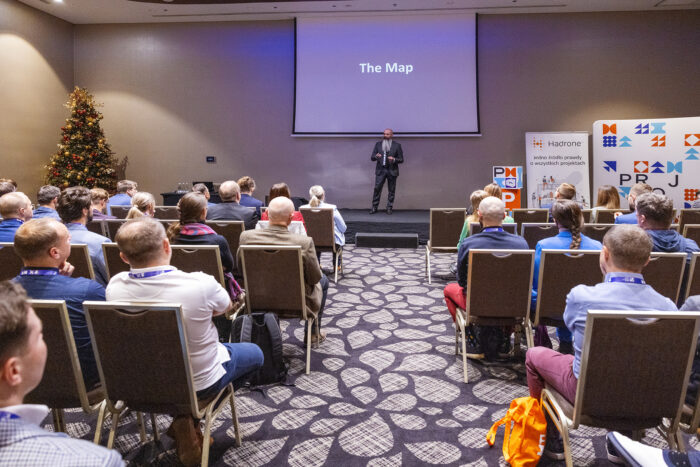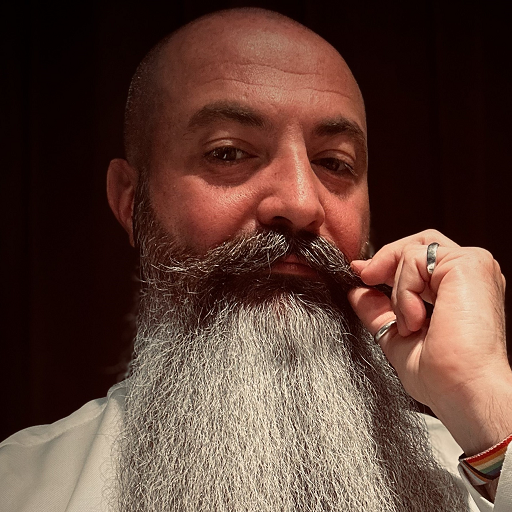Interview with Bruno Morgante by Kamila Czerniak
We have been in touch for two months since the PMI Congress event in Poland. Do you still remember the event? Is there anything specific that you kept in your memories?
When I left the event, one of the things that I took away was how different that conference was compared to plenty of other conferences I have been part of over the past few years.
It gave me the impression of being not just a place where different people get together for multiple reasons, but you could perceive this sense of belonging, this sense of community that most people around me had.
I think it is what you built over there and I want to believe that I was a contributor to that as well, but what you built there in the PMI Poland Chapter is impressive and it can be considered a role model for a lot of other chapters of PMI around the globe.
 Fot. Kamila Czerniak Bruno Morgante and Kamila Czerniak,
Fot. Kamila Czerniak Bruno Morgante and Kamila Czerniak,
Strefa PMI’s vice editor-in-chief
Your impressive 18 years of experience caught my attention. Could you share more about your career path?
Project management and PMO weren’t with me from the beginning. If I take you back with me to the time when I was studying engineering at the Politecnico di Milano in Milano, my city, it was clear that I didn’t want to follow the path of being only a student and I started doing a few little jobs here and there.
And it went like this for a while. Until then, at a certain point, when I was discussing with my best friend, we had this idea and we ended up building it and it was organizing concerts. So nothing to do with the corporate career that I had later on. This concert organization was an entrepreneurial gig, it’s something that the two of us built.
We started with nothing, only a brilliant idea, and we ended up becoming bigger year after year and more known across Italy to the point in which we had hundreds of music bands that were playing across Italy, mainly in the four big cities, Milano, Roma, Bologna, and Torino as well, in which we had a national contest. It was a big thing and it went well.
In the meantime, I finished university and in parallel, I started my corporate career. After my engineering degree, I ended up in a big multinational company in the IT department, which was the perfect place for me to be. I started as an intern, basically doing whatever was necessary. After six months, I started a business analyst path. Business analyst is just a title because, in the end, I was the right hand of the IT director for the whole of Italy.
I also managed some small projects, or initially, they were like work packages within projects, and one day my manager told me: Bruno, I believe that you would be a perfect project manager. And I maintained a certain distance from the concept of a project manager, largely due to the fact that the PMs I observed during these initial months were not the type of PMs one would expect. External consultants coming in and saying to people, okay, this is the plan, these are the tasks, work on it, I’ll come back next week. You cannot manage any project like that. So I thought, I don’t want to be one of them. And my manager told me: oh Bruno, you are precise, accurate, you keep things under control and I think you will do great.
He started appointing me as a PM for all those small initiatives that were global and were arriving in our country. I started as a PM and I quickly realized I loved it and was doing the typical journey from junior PM, then taking bigger projects, around the million euros, then it became programs, then multi-million euros programs, and it went on.
Of course, in the meantime, I changed companies, but it was always on the same path until a certain point in 2017, in which I also had the opportunity to take the lead of the PMO I was a member of as a program manager and since then I’m having fun building, developing and leading PMOs and I love it.
 Fot. Michal Lagoda International PMI Poland Chapter Congress, November 2023
Fot. Michal Lagoda International PMI Poland Chapter Congress, November 2023How can project managers effectively collaborate with a PMO amidst differing processes and standards, while managing their workload and goals? As the head of PMO, what advice would you offer project managers to navigate these challenges more efficiently?
I think we all need to take a step back when we look at that type of picture. PMOs exist for a reason and the reason is not always the same. It might be very different between companies and between industries but I would go at the organizational level because even in the same industry you might find two companies that from the outside are doing the same but they do it in a very different way. So it’s not industry-driven, it’s organizational-driven in my experience.
Now, there is a reason why a certain PMO has been set up. And that reason is very frequently not known to the organization. It might be because the head of that PMO is not able to articulate the reason, or the purpose particularly well. It might be that there is a sort of hidden agenda behind it.
Project managers have one thing to do, which is deliver their project, period. Of course, there are different ways, methodologies, tools, and approaches, but still, they have to make it happen. When you put the two things together, you of course might have some clashes. And I think it is important from one side for PMOs to be successful in their role to articulate very clearly why they do what they do. On the other hand, project managers look at PMOs as an entity that is there to support them.
Now, I can give a few examples. You might have a PMO which is typical, you said it’s providing procedures and documentation, so it’s the governance and control PMO. And that’s pretty typical, like why someone up there might decide to set up a PMO. It is because they might say: okay, I have projects all over the place and everyone is speaking a different language, I receive different updates and reports at different times in different formats, and I don’t understand anything. That person tells me that the project is perfectly on track, but then the stakeholders are telling me that it’s a disaster and that nothing is being delivered.
So how come we don’t speak the same language? We need to put something to have all of that under control. How do I do it? Does put in place a PMO, and hire a head of PMO? It will not work because this is an organizational change, a mindset shift. It’s very big and it needs to be sponsored and supported during the long journey.
If you have a PMO that is there to govern and control, and as a project manager you don’t want to be governed and controlled, then you will have some clash.
Now, as a PMO you would have to explain clearly to the PMs why and how it is going to help them. What’s in it for them? This is the key to starting the proper conversation.
I found myself in one of the PMOs during my career in a place where the organization didn’t want us. There was a person who wanted us, which was the C-level executive who wanted that PMO. So that was a very difficult moment for my team because they could feel that they were not understood and people didn’t listen to them.
And on the other hand, it was a very difficult situation to navigate. I made it very clear to the team that we don’t work for all these others. This is our stakeholder. It is one and it is this person here at the top and this person requested A, B, C and this is what we need to deliver to him.
If you are a professional PM, you know you need to plan, you know that if you don’t know what you have to deliver, you will never be successful. But then this is also something that goes into the level of professionalism of project managers because we know that in a lot of companies around us, we have people who are not professional PMs and they just are appointed as a PM. Some of those even don’t know the definition of a project, simple things like knowing that it has a clear start and a clear end. And then how can you have a conversation with someone like that? You need to start from the basics and here PMO can help with explaining what project management means, what you should keep under control, what standards you should follow etc.
Overall, I think it is important to go back to the basics and start to understand what is the purpose of that PMO and what is the purpose of those project managers in the organization. And then, from that level, you will be able to start seeing that there are things that you have in common and elements in which one can support the other.
I want to believe that PMOs, even if they are not experienced, are there for the main reason which is to support the company as a whole and achieve what they want to achieve.
Going back to basics, this is the direction in which the company wants to go. This is what you have to do as a project manager. This is how we can help you as PMO. The company wants me to provide that type of visibility. I’m not the evil person here. We are in this together.
 Fot. Agata Heinrich-Mastalerz Bruno’s workshop on strategic stakeholder engagement during
Fot. Agata Heinrich-Mastalerz Bruno’s workshop on strategic stakeholder engagement during
International PMI Poland Chapter Congress, November 2023What are the PMO directions expected to be in the future?
I think in the next few years we will see the same pattern that we have seen over the past years. I believe there will be more and more organizations that will realize they can only be successful by delivering successful projects. This is something that in the past was not so clear. It is getting clearer and clearer to a lot of organizations.
I expect then more organizations to potentially start this journey of setting up PMOs, a community of professional PMs to ensure that they know how to be successful in delivering their projects. This is one of the things that we started to observe, we started seeing over the past few years and I think this is going to continue. It requires time, effort, passion, and care and it is a long journey that needs to be strongly supported from the top. In a lot of cases, it would require a mindset shift. It’s not just about implementing methodology or a standard. It’s about changing the culture, which is very difficult. That goes that way.
Some PMOs might be the more advanced ones in the organization that are already doing very well, in delivering projects and doing them in the right way. I think we will also have those types of organizations where PMOs will somehow evolve into a role that is closer to the strategy, and the direction of the organization.
Someone calls them strategy or realization offices, like the evolution of PMOs. And a lot is being said along those lines from Antonio Nieto-Rodriguez, which I am sure you know, and it’s the project economy and how all that is evolving. It’s a fact, it is happening. I think it’s not a trend, it’s the evolution that we have seen over the past few years. I believe it will continue.
Now you need to put Artificial Intelligence on top. With AI coming into the game it is where potentially the things will be disrupted. This is the trend that I see. How organizations are going to embrace AI? It’s potentially going to impact all of these that I described. Some organizations are embracing it and of course, they will face their difficulties but then at a certain point, they will face some advantages out of it.
On the other hand, some companies will not, they will stay behind, and then at a certain point it could be too much behind. It is important to understand that AI is here, and it’s here to stay. It is something that we will all start to use daily, both in our daily lives and at work. It’s going to impact positively a lot of aspects of project management and it will allow people in the project management profession to focus on other things, but that’s another story.
You have also been working as a project manager for a few years. Could you give some advice to the project managers on how they can get things done? But more related to your current position – what is the recipe for good collaboration with PMO?
My first advice is to never stop learning. But then, you also have to keep in mind that methodologies, techniques, ways of working, and tools, are important, but they are not the point. Always remember that at the end of the day, your customers do not care that you deliver in a certain way. What they want is that you deliver what you committed to.
And I know this might be an oversimplification of the situation, but in general, you will always have a customer that wants something with a certain level of criteria, with a certain level of quality and they want it at a certain point in time within a certain amount of money and that resembles what they requested at the beginning. Now, do you do it using that methodology or the other one? That might not be important. It’s not important for the customer.
What should you focus on learning? I tell you, go and focus on human skills, or as they are called in PMI, the Power Skills. Start with learning how to communicate, both in person and online. There are at least some basics to be mastered. Get a proper microphone and other devices, and learn how to use and read body language. It’s also so important to use your voice properly. Learn how to engage your stakeholders, learn how to listen to understand, not to respond. These are foundational skills that everyone who wants to be successful in their profession has to learn. For a project manager, they are particularly important because, as a project manager you deal with different types of people on different levels in your organization, and with different backgrounds, different cultures, and from different time zones. All of this is incredibly important, and that is what I would focus on right now, if I was a new junior PM, I would focus on learning PMI Power Skills. And again, let me add this, when AI is going to hit project management, which is already, AI is going to help you with all the other stuff, but you need to be able to effectively communicate by yourself.
 Fot. Michal Lagoda Bruno Morgante speaking about creating value through projects,
Fot. Michal Lagoda Bruno Morgante speaking about creating value through projects,
International PMI Poland Chapter Congress, November 2023The next question is again about the collaboration between PMO and project managers, but in another context. Have you noticed any differences in the way PMOs operate, depending on the specific industries?
I think there are potentially some generic differences that you might find between industries. There are some in which you have much more attention to governance, and respecting rules and procedures, while in other industries that might be different. But then it is important to go one level below. It’s not the industry, it is the organization.
I have two examples that I can give. Every time I interact with a mentee who is a project manager in a banking sector, they come with complaints that there is so much control in their bank. And I respond then, that to a certain extent I’m happy about that because when I put my money into a bank, I’m happy to know that they have a certain level of rules and control in place.
Another example comes from the industrial world. I worked at a company, where we had a great successful PMO. But we were acquired by another company, same business, same industry, but they were oppositely doing certain things. So we had to adapt. There was a lot of skepticism in the people around me, the kind of „that’s never going to work”, but in the end, it was working.
For something completely different. Is appearance important in business?
I don’t think it is important what I think. I believe there is a lot of research done on the topic and it is pretty clear that if you have a good appearance, it helps you a lot in life, not only in business. And it’s something related to us as human beings.
Now, when we put this on the table some people might say: well, I’m ugly and I will always be. We don’t have to get to that point, but there are so many things that every individual can do to improve that aspect. It is all in your hands.A former MIT professor, beloved Professor Patrick Winston, has a beautiful quote about this: “Your success in life will be determined largely by your ability to speak, your ability to write, and the quality of your ideas, in that order”. And we go back to the same skills that we discussed before. It’s not only about your appearance, but about how you behave, how you interact with others, and how you are perceived by others. It’s something that I started learning on my own years ago and I’m still learning every day. There is so much to learn about it and it’s a beautiful topic.
 Fot. Michal Lagoda Bruno Morgante speaking about creating value through projects,
Fot. Michal Lagoda Bruno Morgante speaking about creating value through projects,
International PMI Poland Chapter Congress, November 2023Yes, but when it comes to learning communication, what kind of method do you have? Reading books, listening to some podcasts about communication? Which method should bring the best results?
There is so much valid material out there that is available for free. So that’s my starting point. I have a few sources that I know are outstanding in their job. Start with this and that’s already potentially six months of training that you can have for free. It’s a material that is available out there and then once you go through it, you already will see that there is more on your side than others.
Now on the tools, it’s a mix of various things. There are good books on the topics, it’s not the type of book that you read once and you put aside. You would potentially keep them next to you and you can go back to them multiple times. There are of course a lot of available videos on YouTube, or other platforms and there are podcasts as well. Then of course a lot of those trainers have built their platforms for learning. And it’s up to you if you want to buy that type of training or not. Some are not particularly expensive and they would help so much.
It all starts with motivation and not money. As I said, there are potentially six months of training, probably more, free out there. The point is: Do you want to start this journey? Are you ready to invest time and effort in yourself?
This awareness for me is crucial. If I understand my areas of improvement, then it’s much easier to look for the proper materials and learn from them. Where should we be looking around for these gaps in our competencies?
Again, there are tools that you can use to discover and improve your self-awareness, which is incredibly powerful. But then you need to get this feedback from the people around you. And I mean not necessarily only your boss, it could be your peers, it could be your partner, your friends. And you will get different observations and different feedback. So you have to proactively get there and trigger that conversation.
And then clearly it is a journey that will bring you into places where you might not like to be. Be prepared to understand that if you receive something that you don’t like, it’s for your good. It would work well if you have access to someone who can guide you specifically into that. Mentors and coaches can also help people into that and a lot of them do it pro bono. But again my point is, that whenever you want to move from where you are to the next stage, you are going to start a journey, which will require time, which will require effort, which will require passion on your side and potentially on the people around you, be aware of that. And then you need to ask yourself, am I willing to do it? Am I willing to bleed for it, fight for it? And if the answer is yes, then go for it.
Thank you very much for this interview. It was a pleasure to have this conversation with you. Is there anything else at the end you would like to share with us?
Assuming that the creators of Strefa PMI are mostly in project management, my message to everyone is that the future is bright. Be happy that you are already in that profession because that profession is going just to get better and better and better. There is going to be an increasing need for good, valid, great project managers out there. PMOs can change things, to impact the way organizations are doing things, doing the right things and doing them right. We are on the good side of the Excel spreadsheet, I would say. Use this opportunity to invest in yourself, get even better, learn continuously, develop yourself, never stop, and go out there and do amazing things.

In everything he does, Bruno believes in challenging the status quo to improve processes, get better results and set things in order. Bruno listens carefully, works with people, communicates clearly, uses storytelling, and believes in the power of positive attitude. Bruno introduces himself with “I solve problems and deliver results”. He leads an amazing team of Project Managers, Portfolio Managers and PMO Specialists.
He has over 18 years of experience in large multinational conglomerates, consistently delivering business results, improving processes, building and leading successful teams, and managing multiple projects simultaneously. As a Coach and Mentor, Bruno supports brilliant individuals and people in need on their development journey. He provides probono guidance, support, and advice about Leadership, Communication, Personal Development, Career Development, PMO, Portfolio, Program, and Project Management. As a Speaker, Bruno delivers engaging keynotes with captivating stories designed to inspire and ignite emotions.
You can find more about Bruno on his website www.brunomorgante.com and on LinkedIn www.linkedin.com/in/brunomorgante
IT Project Manager w SoftServe. Posiada doświadczenie projektowe w implementacji i wdrożeniach systemów klasy ERP, platform B2B, B2C oraz Big Data. Absolwentka Zarządzania i Informatyki na Politechnice Wrocławskiej oraz Wrocławskiej Wyższej Szkole Informatyki Stosowanej. Project Management to pasja i ścieżka kariery, którą stale rozwija poprzez certyfikację, warsztaty, konferencje. Z Project Management Institute związana od 2013 roku. W wolnym czasie podróżuje, szczególnie po wyspach greckich, dronuje, lata szeroko pojętymi środkami, pływa i spełnia marzenia.